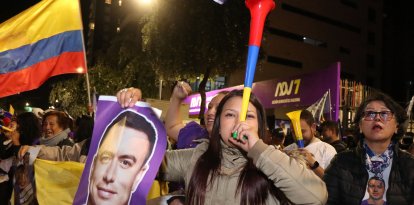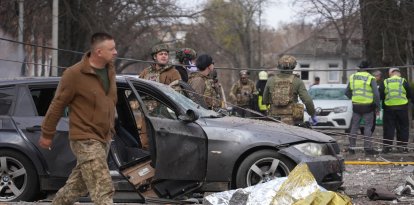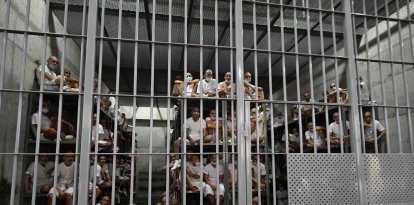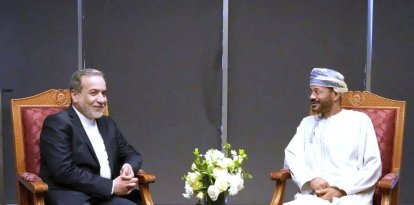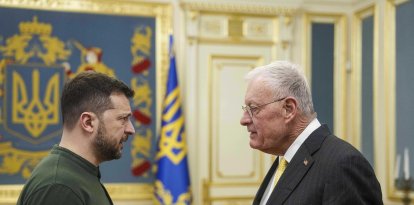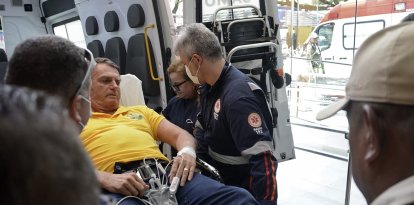Around 200 people killed in Burkina Faso's 'worst Islamist terrorist attack'
Local authorities downplayed the attack, as they are unable to counter the influence of Al Qaeda-linked armed groups in the region.
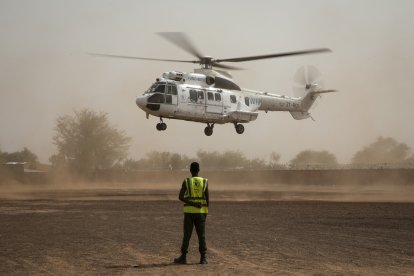
A U.N. helicopter takes off in Burkina Faso.
It was a bloody weekend of Islamist terrorism in Burkina Faso. Armed gangs linked to Al Qaeda have killed around 200 civilians in the northern region of the country, according to early reports.
The main attack took place in the town of Barsalogho, located in the north of the country more than 90 miles from the capital of Ouagadougou. The region has been affected for years by growing insecurity mainly due to Islamic terrorist groups, which also commit theft and other crimes.
According to information coming in from media correspondents, locals were hesitating about whether or not to put up some rudimentary defenses, under recommendation of the military junta that has been in power since 2022 following a coup d'état. It was then that armed militias linked to Al Qaeda attacked the region.
The terrorists arrived on motorcycles and vans and opened fire indiscriminately against the population and the military stationed there.
Preliminary counts estimate between 140 and 200 dead, in addition to several hundred wounded. According to Radio France Internationale, citing local sources, there was at least one death in each of the families in the area.
The military junta has not fully confirmed the figures and seems to prefer to hide the incident. According to French-speaking outlet La Croix, it is the deadliest attack by Islamist terrorists to date in the country.
Some of the wounded were evacuated to Kaya hospital, roughly 30 miles from Barsalogho. According to La Croix, the only official information about the attack in Barsalogho was given the day after the attack on national television. The state channel focused on the visit of a delegation of the military junta to the Kaya hospital to see the wounded.
A regime spokesman gave no clarification about the number of casualties, the perpetrators or their motives. The imprecision was maintained in the Monday, Aug. 26, report from Burkinabe, which only repeated the information broadcast the previous day by state television.
US embassy condemns attack
"The United States also expresses its deep concern for the millions of people who have been forced to flee their homes by the ongoing terrorist violence," reads the terse statement from the diplomatic delegation, which maintains relations with the military junta.
Region swarming with Islamist terrorism
The violence in Burkina Faso is much more acute in the north of the country where Mali, Burkina Faso and Niger share borders. These three countries, which are separated by extremely porous boundaries, due to the large desert expanses that make up their geography, the perfect terrain for the expansion of Islamist terrorism.
Since 2010, Al Qaeda for the Islamic Maghreb has found in this region a perfect place to establish operational bases and capture disillusioned young people with no future prospects. On many occasions, terrorist activity is mixed with theft as a means of economic support for armed gangs.
The political situation has not improved either. Since 2020, the Sahel region has been the scene of a succession of coups d'états, some successful, replacing governments with transitional military juntas, which have persisted in power ever since. In Burkina Faso, a group of military officers staged a coup d'état led by Ibrahim Traoré, now proclaimed president. The situation is similar in Mali and Niger. In all these countries, the new governments have made a geopolitical about-face to move closer to Putin's Russia and condemn Western powers, especially France.
The former colonial power, reconverted into a pacifying and stabilizing force in the region, was forced to abandon a counter-terrorist military scenario on which it embarked with Operation Serval in 2013, followed by peacekeeping with Operation Barkhane. Since then, military juntas have collaborated with Russian paramilitary groups with dubious success in their purpose of bringing peace to the Sahel.
RECOMMENDATION
